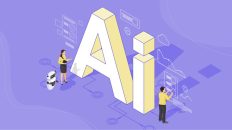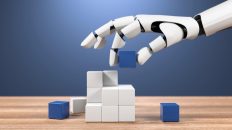Recent years have seen a significant change in the recruiting scene due to the growing application of artificial intelligence (AI). The way that businesses find, evaluate, and hire people is being completely transformed by AI-enhanced recruitment platforms. These systems are intended to improve candidate matching, lessen bias among recruiting managers, and boost overall productivity. AI is playing a more important role in recruitment than it has ever played, as businesses around the world struggle with a lack of talent, high employee turnover, and a fiercely competitive labor market.
The Power of AI in Recruitment
AI-enhanced recruitment platforms leverage a variety of advanced technologies, including machine learning, natural language processing (NLP), and predictive analytics, to automate and optimize various stages of the hiring process. These platforms can sift through large volumes of candidate data, analyze skills, and even predict job performance based on past experiences and qualifications. In this way, AI acts as a valuable assistant to HR professionals, allowing them to make data-driven decisions rather than relying solely on intuition.
One of the most significant advantages of using AI in recruitment is its ability to enhance the sourcing of candidates. Traditional recruitment methods often rely on job postings and passive candidate pools, but AI-enabled platforms can proactively scour the web for top talent. By analyzing publicly available data, social media profiles, and professional networks, these platforms can identify individuals who may not be actively searching for jobs but who match the required qualifications for a particular role. This broader talent search enables companies to tap into a much larger pool of potential candidates, increasing the chances of finding the perfect fit.
Also read – For GenZ, work-life balance and mental health are top priorities: Survey
Reducing Human Bias in Hiring
Bias in hiring is a long-standing issue that can lead to a lack of diversity in the workplace and missed opportunities for qualified candidates. Whether conscious or unconscious, human biases can affect how resumes are reviewed, interviews are conducted, and final hiring decisions are made. AI-enhanced recruitment platforms have the potential to mitigate this bias by focusing solely on the skills, experience, and qualifications of each candidate.
For example, AI algorithms can anonymize candidate information such as names, genders, and ethnicities when screening resumes. This allows HR professionals to evaluate candidates based on merit rather than being influenced by demographic factors. Furthermore, AI can identify patterns of discrimination in past hiring decisions and suggest ways to improve diversity and inclusion efforts within an organization. By creating a more objective and data-driven hiring process, AI can help foster a fairer and more inclusive work environment.
Improving Candidate Experience and Engagement
AI is not just transforming recruitment from the company’s perspective—it is also enhancing the candidate experience. One of the most common frustrations job seekers face is the lack of communication from potential employers during the application process. AI-enhanced platforms can automate much of this communication, providing real-time updates on application status, interview scheduling, and next steps. This level of transparency improves engagement and helps build a positive relationship with candidates, even if they are not ultimately hired.
AI-powered chatbots are also being used to answer candidate queries, provide information about job roles, and guide applicants through the hiring process. These chatbots can operate 24/7, offering candidates immediate assistance and reducing the workload for HR teams. Additionally, some platforms use AI to assess candidates’ skills through interactive assessments and gamified challenges, which not only make the process more engaging but also provide employers with a more accurate measure of a candidate’s abilities.
Data-Driven Decision Making
AI platforms have the ability to analyze historical hiring data and identify trends that can inform future recruitment strategies. For example, AI can predict how long a candidate might stay in a role based on their career history or assess which sourcing channels yield the best results for specific job types. This data-driven approach enables HR teams to make more informed decisions and improve their hiring processes over time.
Predictive analytics also allow companies to forecast future hiring needs based on industry trends, workforce changes, and company growth. This forward-thinking approach enables businesses to stay ahead of talent shortages and build a robust pipeline of qualified candidates. By leveraging AI’s ability to analyze vast amounts of data quickly, organizations can adopt a more strategic approach to talent acquisition and workforce planning.
Challenges and Ethical Considerations
Despite the many advantages of AI-enhanced recruitment platforms, there are challenges and ethical concerns that must be addressed. AI algorithms are only as good as the data they are trained on, meaning that biased or incomplete data can lead to flawed hiring recommendations. There is also the risk of over-reliance on AI, with human intuition and judgment being overlooked in favor of algorithmic decisions.
To mitigate these risks, it is crucial that AI tools are developed with fairness and transparency in mind. Companies must regularly audit their AI systems to ensure that they are not perpetuating bias or discrimination. Additionally, the role of HR professionals remains essential in overseeing the hiring process and making final decisions that consider both data insights and human factors.
Conclusion
AI-enhanced recruitment platforms are transforming talent sourcing by offering a more efficient, unbiased, and data-driven approach to hiring. These platforms allow companies to access larger talent pools, improve diversity and inclusion efforts, and enhance the candidate experience. While challenges remain, the benefits of AI in recruitment are undeniable, making it an indispensable tool for HR professionals navigating the complexities of today’s job market. As AI continues to evolve, its role in shaping the future of talent acquisition will only become more prominent, driving innovation and success in the world of recruitment.
Stay connected with us on social media platforms for instant updates click here to join our LinkedIn, Twitter & Facebook
























